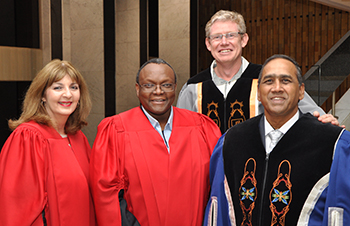Latest News Archive
Please select Category, Year, and then Month to display items
18 August 2021
|
Story Division of Student Affairs
![]()
The SRC Elections for the elective portfolios will be held from 12 to 15 October 2021 for the Bloemfontein, Qwaqwa and South Campuses.
Following the official announcement of the election schedule on 16 August 2021, the processes below are to unfold:
a. Candidate nominations for CSRC elective portfolios will open on 23 August, until 10 September 2021;
b. Ex-officio portfolio elections will take place on 11 October 2021;
c. Manifesto launches will take place via webinars from 15 September to 11 October 2021;
d. Declaration of final election results will be on 18 October 2021.
KDBS Consulting (Pty) Ltd has been appointed as the independent Chief Elections Administrator that is to oversee and manage the 2021 online SRC elections.
A website will be launched to provide updated information regarding all processes that are to unfold. A detailed schedule will also be made available via the official elections website that will be hosted by the service provider.
For any queries related to the elections, communication is to be sent via email to the Chief Election Administrator at
ufssrcelections@kdbs.co.za Communication to the election helpdesk may also be sent via direct call or on WhatsApp at
+27 0 61 452 4499.
Election specific notifications will be communicated via email and SMS.
Official elections will take place from 12-15 October 2021.

Prof Tim Murithi calls for Africa to design new global order
2016-06-02

From left: Prof Heidi Hudson, Head of Centre for Africa
Studies (CAS); Prof Tim Murithi, Extraordinary Professor
at CAS; Prof Lucius Botes, Dean of the Faculty of
the Humanities; and Prof Prakash Naidoo, Principal of
Qwaqwa Campus.
Photo: Stephen Collet
“What do Africans have to say about the remaking of the global order?” was the opening question of Prof Tim Murithi’s lecture which was hosted by the Centre for Africa Studies (CAS) of the University of the Free State (UFS) to celebrate Africa Day on 25 May 2016.
The annual Africa Day Memorial Lecture, entitled: Africa and the Remaking of the Global Order, doubled as Prof Murithi’s inaugural lecture. He is CAS’s newly-appointed Extraordinary Professor, as well as the Head of the Justice and Reconciliation in Africa Programme at the Institute for Justice and Reconciliation in Cape Town. He made a compelling argument for the need for Africa to exert an active influence on international narratives of peace, governance, justice, and reconciliation.
“If we are waiting for American leadership to get us out of the quagmire of a situation we are in, we will be waiting for a long time,” said Prof Murithi.
The Head of the Centre, Prof Heidi Hudson, concurred with Prof Murithi’s suggestion of devising African solutions for African problems. She quoted Audre Lorde’s well-known assertion that “The master’s tools will never dismantle the master’s house.”
Remembering 1963
Over five decades ago, on 25 May 1963, the Organisation of African Unity was formed, and was renamed the African Union in 2002. Africa Day marks this pivotal point in the continent’s history. On this day, we reflect on the continent’s journey into democracy, peace, stability and socio-economic development. It is also an opportunity to celebrate African identity and heritage.
Continent-building dialogues
The UFS Sasol Library celebrated Africa Day with a book launch. Facets of Power. Politics, Profits and People in the Making of Zimbabwe's Blood Diamonds by Tinashe Nyamunda is a reflection of some of the challenges that Zimbabwe continues to face. It details the disadvantaged position which the country finds itself in due to greed, maladministration, and corruption, despite possessing large deposits of minerals.
In celebration of Africa Month, CAS has held a series of lectures by esteemed scholars from across the globe. Earlier in the month, Prof Henning Melber presented lectures on Namibia’s independence and the African middle class. Kevin Bloom and Richard Poplak unpacked the issues surrounding Africa’s continental shift, while Prof Joleen Steyn Kotze focused on the possible fall of the African National Congress.